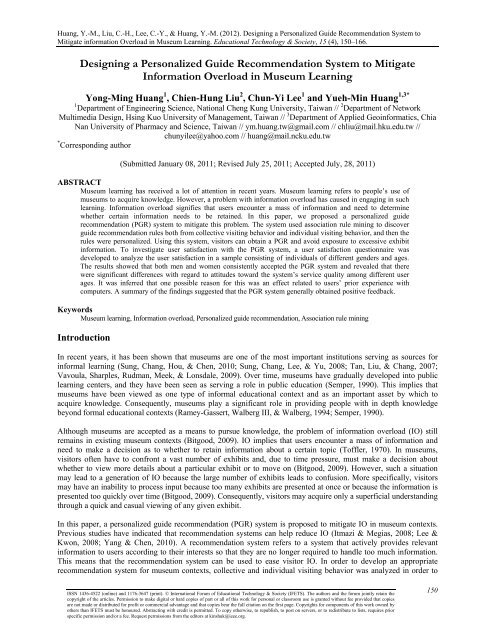October 2012 Volume 15 Number 4 - Educational Technology ...
October 2012 Volume 15 Number 4 - Educational Technology ...
October 2012 Volume 15 Number 4 - Educational Technology ...
You also want an ePaper? Increase the reach of your titles
YUMPU automatically turns print PDFs into web optimized ePapers that Google loves.
Huang, Y.-M., Liu, C.-H., Lee, C.-Y., & Huang, Y.-M. (<strong>2012</strong>). Designing a Personalized Guide Recommendation System to<br />
Mitigate information Overload in Museum Learning. <strong>Educational</strong> <strong>Technology</strong> & Society, <strong>15</strong> (4), <strong>15</strong>0–166.<br />
Designing a Personalized Guide Recommendation System to Mitigate<br />
Information Overload in Museum Learning<br />
Yong-Ming Huang 1 , Chien-Hung Liu 2 , Chun-Yi Lee 1 and Yueh-Min Huang 1,3*<br />
1 Department of Engineering Science, National Cheng Kung University, Taiwan // 2 Department of Network<br />
Multimedia Design, Hsing Kuo University of Management, Taiwan // 3 Department of Applied Geoinformatics, Chia<br />
Nan University of Pharmacy and Science, Taiwan // ym.huang.tw@gmail.com // chliu@mail.hku.edu.tw //<br />
chunyilee@yahoo.com // huang@mail.ncku.edu.tw<br />
* Corresponding author<br />
(Submitted January 08, 2011; Revised July 25, 2011; Accepted July, 28, 2011)<br />
ABSTRACT<br />
Museum learning has received a lot of attention in recent years. Museum learning refers to people’s use of<br />
museums to acquire knowledge. However, a problem with information overload has caused in engaging in such<br />
learning. Information overload signifies that users encounter a mass of information and need to determine<br />
whether certain information needs to be retained. In this paper, we proposed a personalized guide<br />
recommendation (PGR) system to mitigate this problem. The system used association rule mining to discover<br />
guide recommendation rules both from collective visiting behavior and individual visiting behavior, and then the<br />
rules were personalized. Using this system, visitors can obtain a PGR and avoid exposure to excessive exhibit<br />
information. To investigate user satisfaction with the PGR system, a user satisfaction questionnaire was<br />
developed to analyze the user satisfaction in a sample consisting of individuals of different genders and ages.<br />
The results showed that both men and women consistently accepted the PGR system and revealed that there<br />
were significant differences with regard to attitudes toward the system’s service quality among different user<br />
ages. It was inferred that one possible reason for this was an effect related to users’ prior experience with<br />
computers. A summary of the findings suggested that the PGR system generally obtained positive feedback.<br />
Keywords<br />
Museum learning, Information overload, Personalized guide recommendation, Association rule mining<br />
Introduction<br />
In recent years, it has been shown that museums are one of the most important institutions serving as sources for<br />
informal learning (Sung, Chang, Hou, & Chen, 2010; Sung, Chang, Lee, & Yu, 2008; Tan, Liu, & Chang, 2007;<br />
Vavoula, Sharples, Rudman, Meek, & Lonsdale, 2009). Over time, museums have gradually developed into public<br />
learning centers, and they have been seen as serving a role in public education (Semper, 1990). This implies that<br />
museums have been viewed as one type of informal educational context and as an important asset by which to<br />
acquire knowledge. Consequently, museums play a significant role in providing people with in depth knowledge<br />
beyond formal educational contexts (Ramey-Gassert, Walberg III, & Walberg, 1994; Semper, 1990).<br />
Although museums are accepted as a means to pursue knowledge, the problem of information overload (IO) still<br />
remains in existing museum contexts (Bitgood, 2009). IO implies that users encounter a mass of information and<br />
need to make a decision as to whether to retain information about a certain topic (Toffler, 1970). In museums,<br />
visitors often have to confront a vast number of exhibits and, due to time pressure, must make a decision about<br />
whether to view more details about a particular exhibit or to move on (Bitgood, 2009). However, such a situation<br />
may lead to a generation of IO because the large number of exhibits leads to confusion. More specifically, visitors<br />
may have an inability to process input because too many exhibits are presented at once or because the information is<br />
presented too quickly over time (Bitgood, 2009). Consequently, visitors may acquire only a superficial understanding<br />
through a quick and casual viewing of any given exhibit.<br />
In this paper, a personalized guide recommendation (PGR) system is proposed to mitigate IO in museum contexts.<br />
Previous studies have indicated that recommendation systems can help reduce IO (Itmazi & Megias, 2008; Lee &<br />
Kwon, 2008; Yang & Chen, 2010). A recommendation system refers to a system that actively provides relevant<br />
information to users according to their interests so that they are no longer required to handle too much information.<br />
This means that the recommendation system can be used to ease visitor IO. In order to develop an appropriate<br />
recommendation system for museum contexts, collective and individual visiting behavior was analyzed in order to<br />
ISSN 1436-4522 (online) and 1176-3647 (print). © International Forum of <strong>Educational</strong> <strong>Technology</strong> & Society (IFETS). The authors and the forum jointly retain the<br />
copyright of the articles. Permission to make digital or hard copies of part or all of this work for personal or classroom use is granted without fee provided that copies<br />
are not made or distributed for profit or commercial advantage and that copies bear the full citation on the first page. Copyrights for components of this work owned by<br />
others than IFETS must be honoured. Abstracting with credit is permitted. To copy otherwise, to republish, to post on servers, or to redistribute to lists, requires prior<br />
specific permission and/or a fee. Request permissions from the editors at kinshuk@ieee.org.<br />
<strong>15</strong>0

















